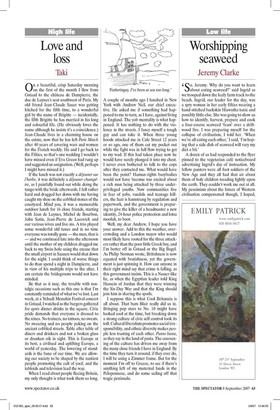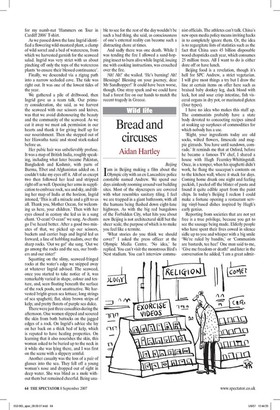Worshipping seaweed
Jeremy Clarke L C o. Jeremy. Why do you want to learn L3 about eating seaweed?' said Ingrid as we trooped down the leafy farm track to the beach. Ingrid, our leader for the day, was a spry woman in her early fifties wearing a hand-stitched buckskin Hiawatha tunic and possibly little else. She was going to show us how to identify, harvest, prepare and cook a four-course seaweed 'feast' over a driftwood fire. I was preparing myself for the collapse of civilisation, I told her. 'When we're all eating each other,' I said, 'I'm hoping that a side dish of seaweed will vary my diet a bit.'
A dozen of us had responded to the flyer pinned to the vegetarian café noticeboard advertising Ingrid's day of instruction. My fellow punters were all foot soldiers of the New Age and they all had that air about them of holy children treading lightly upon the earth. They couldn't work me out at all. My pessimism about the future of Western civilisation compensated though, I hoped, for my numb-nut 'Hammers on Tour in Cardiff 2006' T-shirt.
As we passed down the lane Ingrid identified a flowering wild-mustard plant, a clump of wild sorrel and a bed of watercress, from which we harvested garnish for the seaweed salad. Ingrid was very strict with us about pinching off only the tops of the watercress plants 'to ensure their blessed continuance'.
Finally, we descended via a zigzag path into a narrow secluded cove. The tide was right out. It was one of the lowest tides of the year.
We gathered a pile of driftwood, then Ingrid gave us a team talk. Our primary consideration, she said, as we harvest the seaweed with our scissors and knives, was that we avoid dishonouring the beauty and the community of the seaweed. As we cut it away we must ask permission in our hearts and thank it for giving itself up for our nourishment. Then she stepped out of her Hiawatha tunic and stood stark-naked before us.
Her pubic hair was unbelievably profuse. It was a map of British India, roughly speaking, including what later became Pakistan, Bangladesh and Kashmir, with parts of Burma, Tibet and Afghanistan added on. I couldn't take my eyes off it. All of us except two then followed her lead and stripped right off as well. Opening her arms in supplication to embrace rock, sea and sky, and tilting her map of India at the horizon, Ingrid intoned, 'This is all a miracle and a gift to us all. Thank you, Mother Ocean, for welcoming us here, your children.' Then with her eyes closed in ecstasy she led us in a sung chant. `0-cean! 0-cean!' we sang. As chants go I've heard better. After a good two minutes of that, we picked up our scissors, buckets and carrier bags and Ingrid led us forward, a line of hobbling nudists, over the sharp rocks. 'Out we go!' she sang. 'Out we go among the rocks and the sea, our brothers and our sister!'
Squatting on the slimy, seaweed-fringed rocks at the water's edge we snipped away at whatever Ingrid advised. The seaweed, once you started to take notice of it, was remarkably varied in shape, colour and texture, and, seen floating beneath the surface of the rock pools, not unattractive. We harvested bright-green sea lettuce; long strings of sea spaghetti; flat, shiny brown strips of kelp; and pretty florets of purple sea dulce.
There were just three casualties during the afternoon. One women slipped and scoured the skin from both buttocks on the jagged edges of a rock. On Ingrid's advice she lay on her back on a thick bed of kelp, which is reputed to have healing properties. On learning that it also nourishes the skin, this woman asked to be buried up to the neck in it while she was lying there, and I was first on the scene with a slippery armful.
Another casualty was the loss of a pair of glasses into the sea. They fell off a young woman's nose and dropped out of sight in deep water. She was blind as a mole without them but remained cheerful. Being unable to see for the rest of the day wouldn't be such a bad thing, she said, as consciousness of one's external reality can become such a distracting chore at times.
And sadly there was one death. While I was tending the fire I allowed a sand-hopping insect to burn alive while Ingrid, issuing me with cooking instructions, was crouched over the fire.
Ah! Ah!' she wailed. 'He's burning! Ah! Blessings! Blessing on your journey, dear Mr Sandhopper!' It could have been worse, though. One stray spark and we could have had a forest fire on our hands to match the recent tragedy in Greece.




































































 Previous page
Previous page